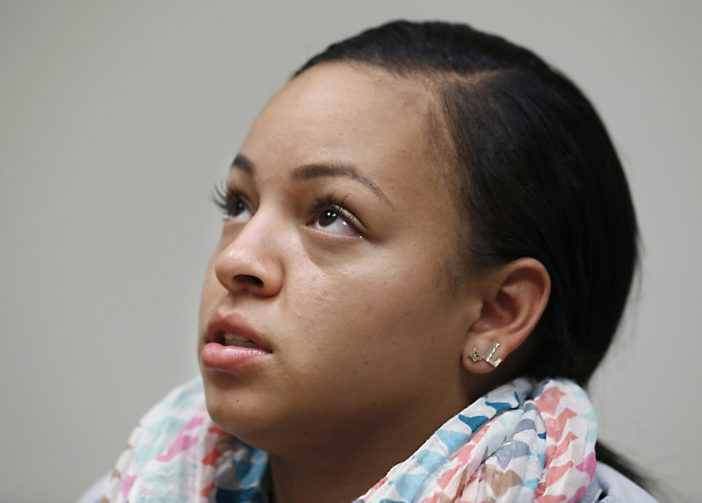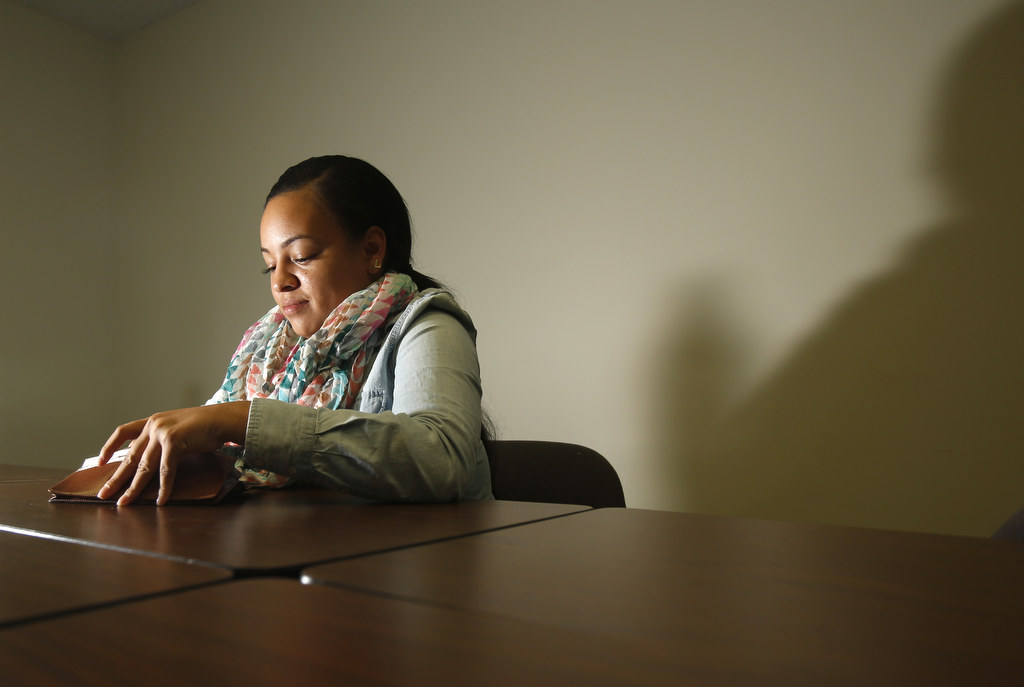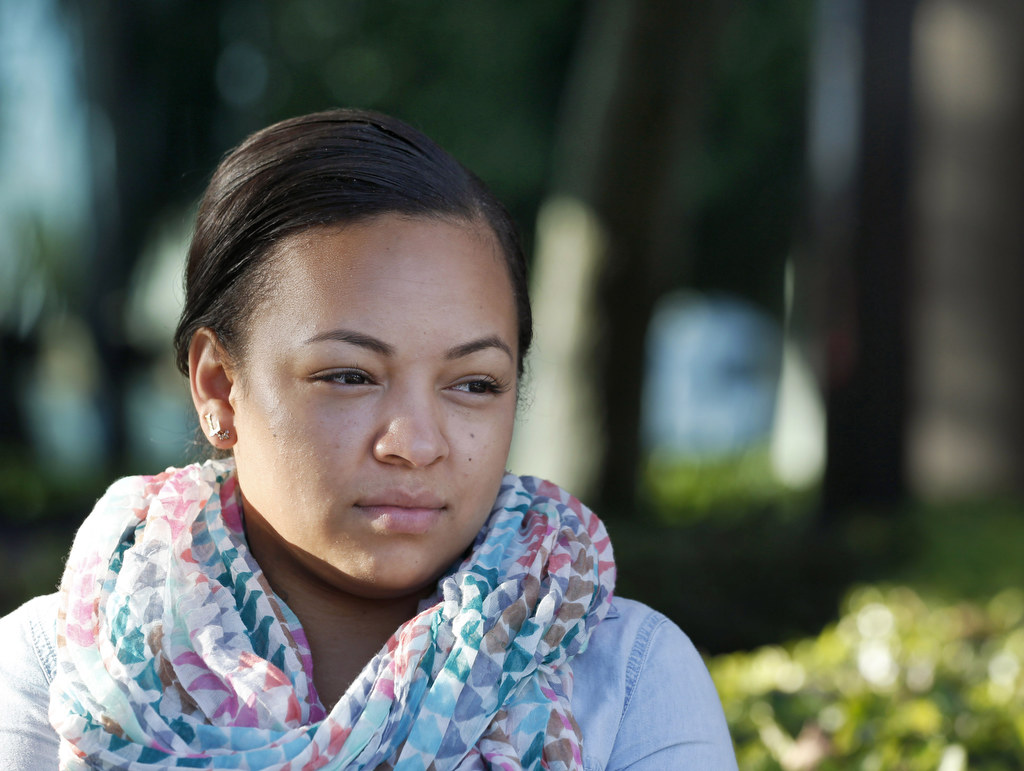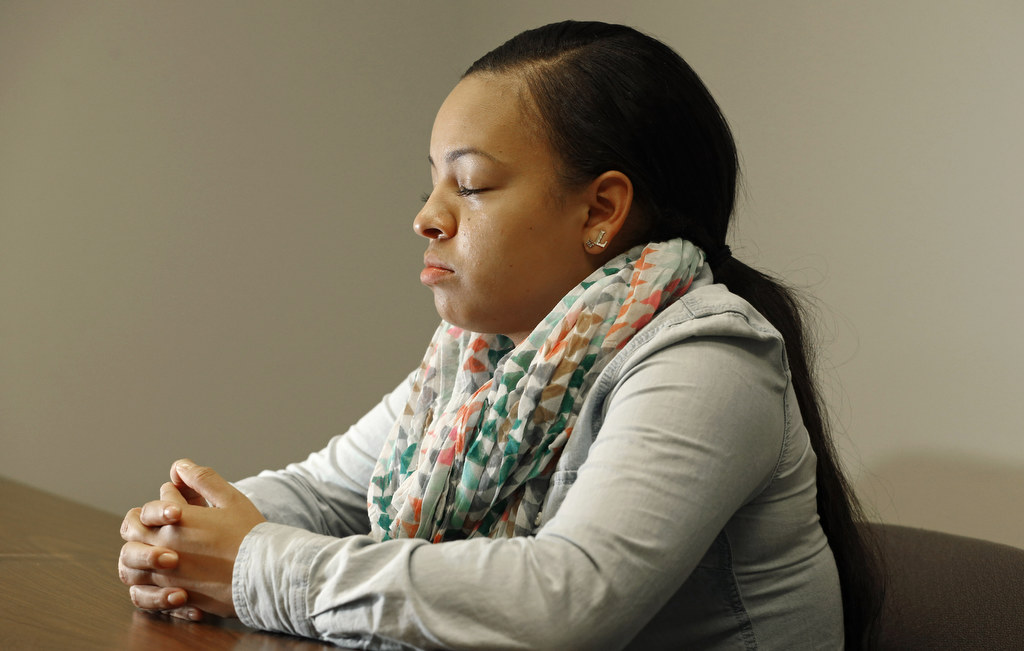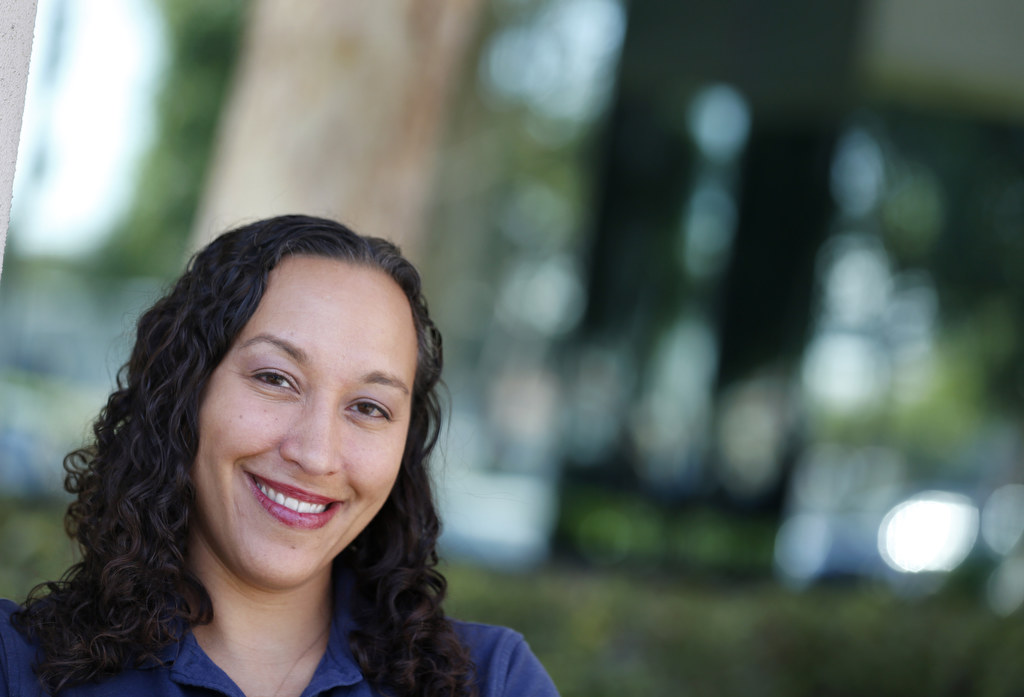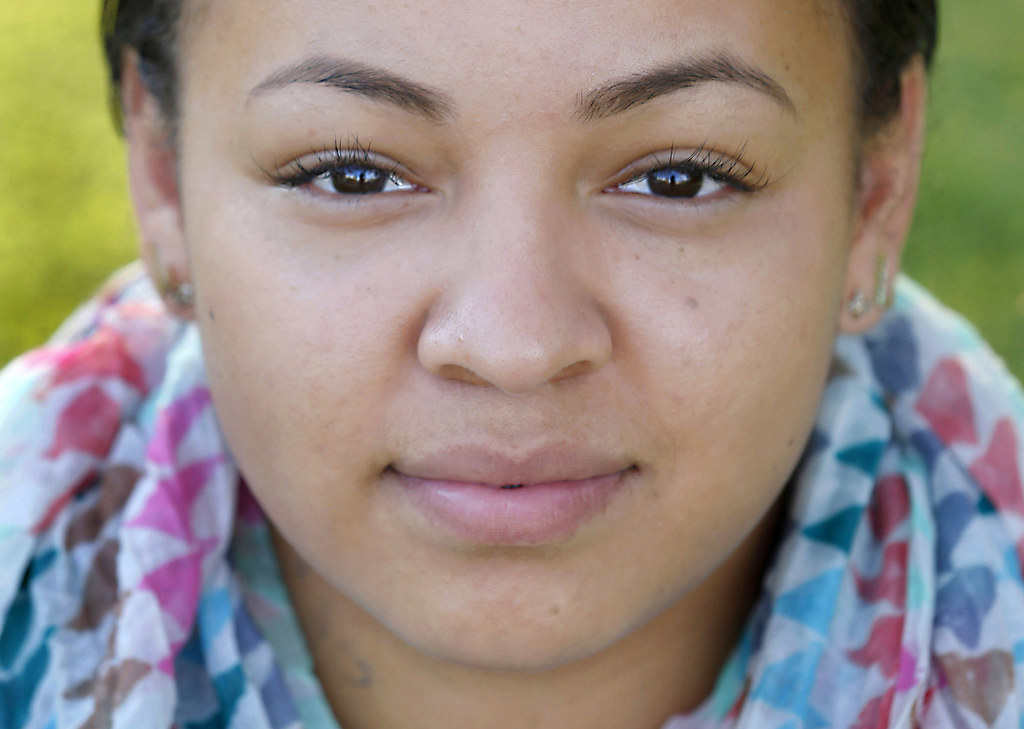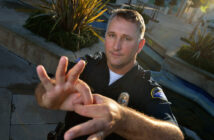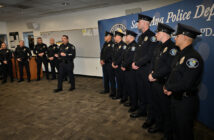To mark our 10th anniversary, we are sharing some of our top stories from our archives. This one was originally published on Jan. 20, 2016.
Here’s how it happens.
You are an only child being raised by a single mom.
She works two jobs.
A family “friend” begins molesting you.
You are 9.
At 10, you are taking a shortcut to a friend’s house through a sketchy neighborhood when a couple of guys drag you into a laundry room and rape you. Your mom believes you. But others tell her it must be your fault.
At 11, you find out from a cousin that you are adopted. You were actually born in a state prison to a mother who was addicted to drugs.
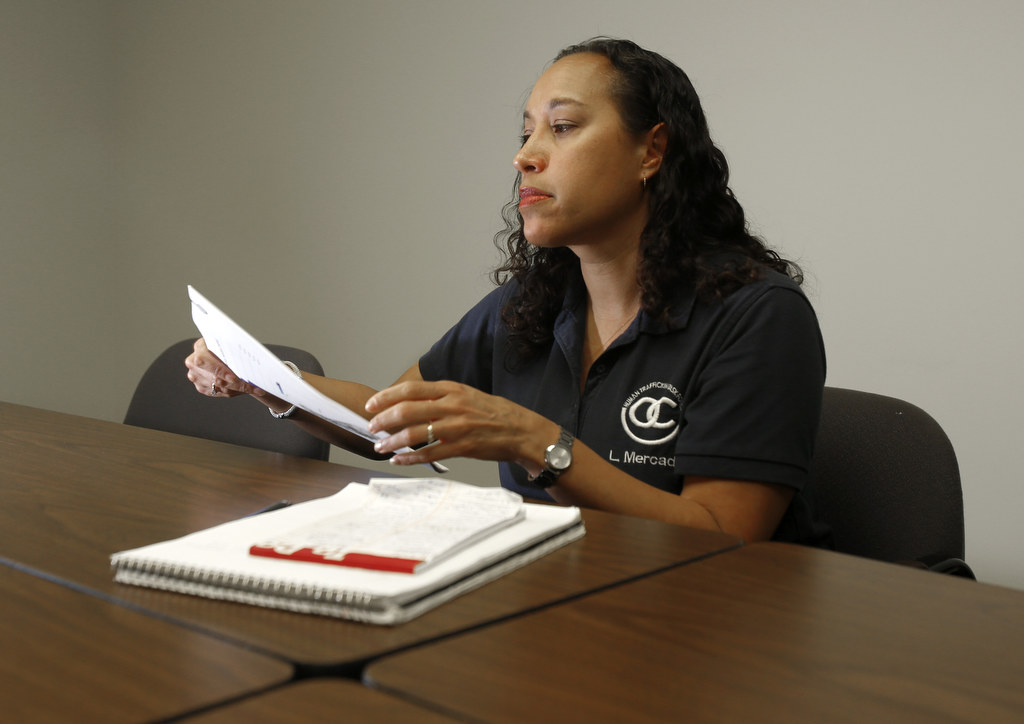
Lita Mercado, director of victim assistance programs for Community Service Programs Inc. in Santa Ana, works with victims of sex trafficking.
Photo by Christine Cotter
You get into yet another fight at school. Your punishment is community service at a library.
And that’s where you meet your first real friend. One night you run away together. She has an older boyfriend. He takes you both to a house.
Your friend and her boyfriend leave you alone with a man who lives at the house.
He asks if you’re OK. Wonders why you look sad. For the first time it seems like someone really cares about the answer.
You tell him your story. How no one listens. No one cares. You’re sick of it.
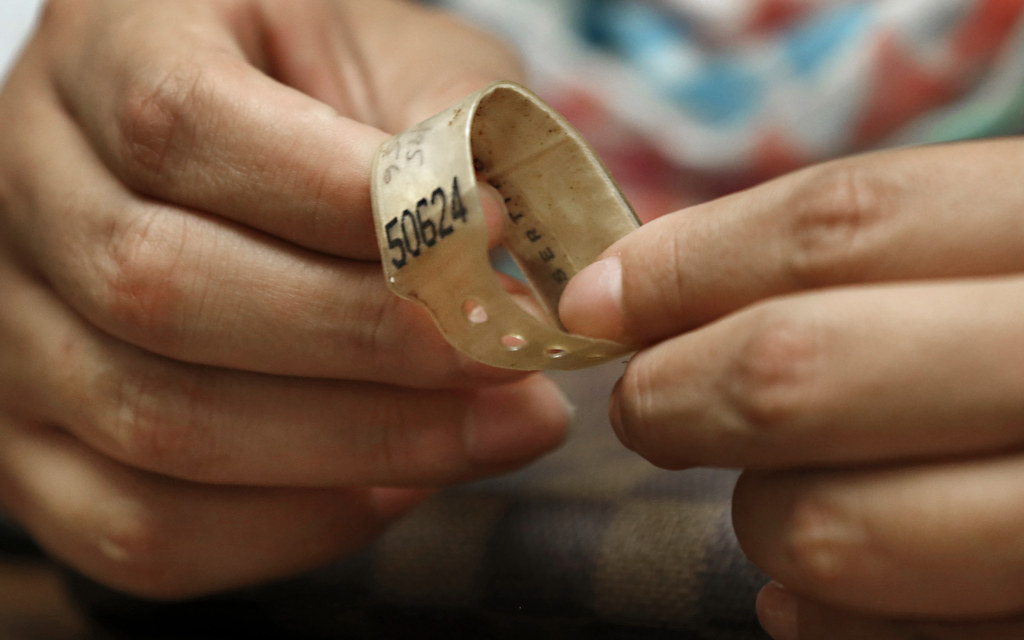
Oree holds the wristband she received at birth. She spent years as a victim of child sex trafficking in Orange County.
Photo by Christine Cotter
He understands. He tells you he’s going to be the father you never had. He is going to love you, make you feel safe.
He gives you a bath. He gives you new clothes. He tells you to stay and you’ll be a family.
That night a lady living in the house heads out to “work the streets.”
Huh?
He explains: You know all those men taking advantage of you. It’s kind of like payback. She has sex with people’s husbands and takes their money.
And he thinks you should do the same thing. You don’t want to that. You start crying. You want to go home.
And just like that Romeo Pimp turns into Gorilla Pimp.
He slaps you and drags you out of his car to your first customer.
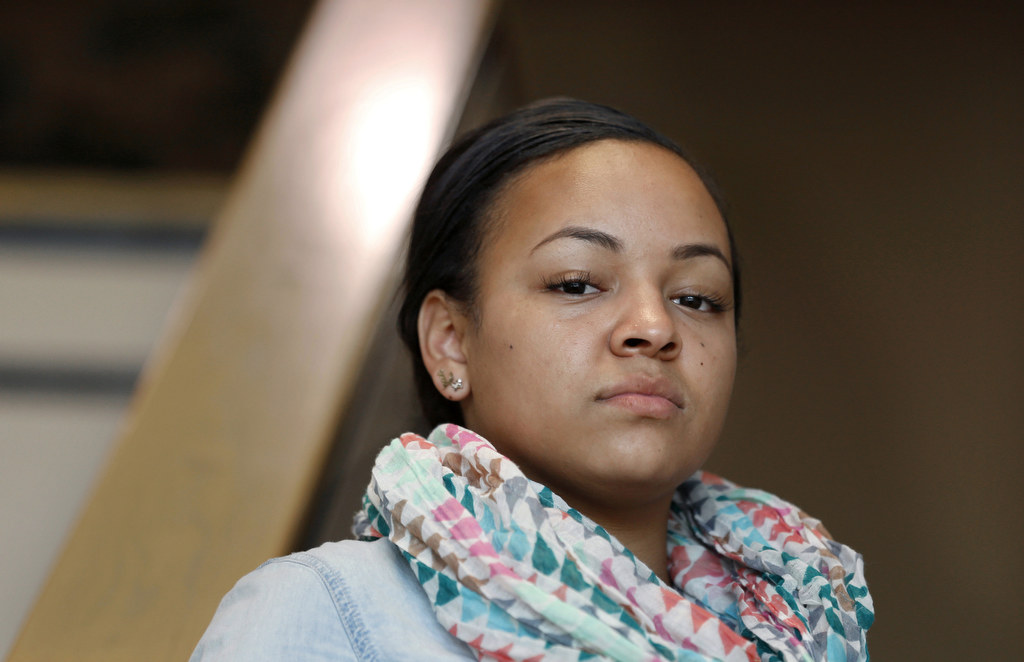
Oree discusses her years as a victim of child sex trafficking in Orange County.
Photo by Christine Cotter
“That was my life for the next four years,” says Oree. “I was beat. I was raped. I didn’t eat at times. There is no sleep out there.”
Out there.
All around Orange County.
***
In 2014, the OC Human Trafficking Task Force provided services to 145 victims. Most are victims of sex trafficking. About a quarter are minors.
Sex slaves are the newest victim population in the county.
That’s why the Anaheim and Irvine Police Departments, the Orange County Sheriff’s Department, the California Highway Patrol and the non-profit Community Service Programs Inc. formed the Orange County Human Trafficking Task Force. The Santa Ana Police Department is the latest to announce they are going to dedicate an officer to the task force. The Orange County District Attorney’s Office also is on the task force.
But the pimp is one of the slipperiest criminals to catch. Few are actually from here. They travel a circuit, driving girls in an endless loop from San Francisco to Las Vegas to San Diego and L.A.
By moving the girls around, the pimps not only evade police, they also keep the girls confused. They don’t know where they are or where they’re going.
“The life,” is what they call it.
“It has its own rules and regulations and world,” Oree says. “It has its own language.”
Here’s how it works:
A pimp will have up to six girls — however many fit in his car. Oree remembers a pimp once making a girl travel all the way to Vegas in the trunk of his old Buick.
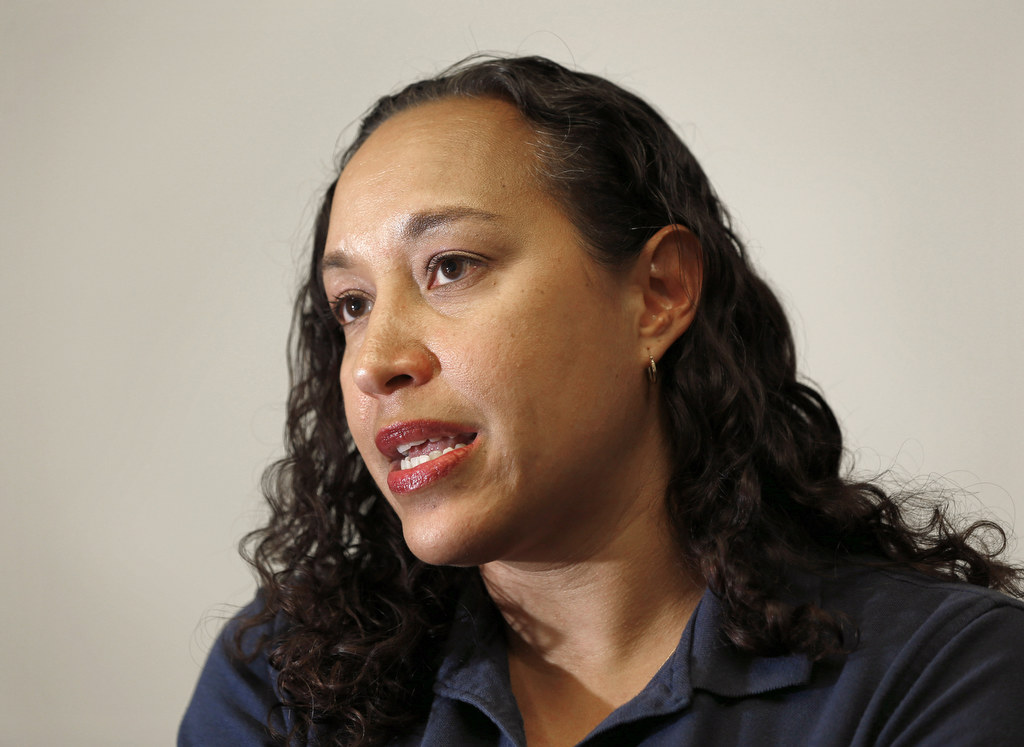
Lita Mercado, director of victim assistance programs for Community Service Programs Inc. in Santa Ana, discusses her work with victims of human sex trafficking.
Photo by Christine Cotter
It’s on the road that the girls get to sleep. When they stop at a hotel, it is time to work. Either the pimp checks in, or one of his older “bottom bitches.”
The girls wait in the car. Once a room is paid for, they are given the key to go in. Then men start arriving. Rich. Poor. Every race.
“They don’t have a certain look,” Oree says. “They are guys who want to buy sex. The younger, the better. Some of them told me they had children at home my age.”
Oree, like all girls in “the life,” had a daily quota, usually $800 to $1,100 a day. That’s 10 to 15 guys a day.
It’s actually not that difficult to meet. There are hundreds of advertisements for sex in Orange County every day on the Internet. Just punch in your city and preference.
The pimp pockets every cent, by the way. In exchange for their work, the girls get meals and a place to sleep. Unless they don’t hit their quota. Then they don’t eat. Or worse.
Don’t meet your quota, and here comes a hot curling iron. A punch in the face.
There are two kinds of pimps.
The Romeo Pimp is one. He tells you he’s your boyfriend.
“He’s the guy who comes and sweeps you off your feet,” Oree said. “He doesn’t use a lot of violence. Only as a consequence.” Like if you don’t meet your quota.
And then there’s the Gorilla Pimp, who keeps you in line with fear and violence.
Oree has had both.
Her Romeo pimp, the guy who promised to protect her that night she ran away, wound up getting arrested.
She was taken into custody as a runaway. In juvenile hall, she met another girl in “the life,” and the two ran away. And that’s when Oree fell into the grip of the Gorilla Pimp.
Pimps prey on runaways.
Girls running away from foster care or a home with abuse. Girls with no fathers. Girls who are being molested.
You get a girl like that and you can keep them in line with psychological warfare. Physical violence isn’t even needed.
The control is suffocating. Girls must always ask for permission, even to go to the bathroom.
“Don’t make eye contact, keep your head down,” Oree says.
“A lot of people don’t understand. They don’t know the feeling of being isolated, of having everything taken from you, being alone, being cold at night or your stomach turning.”
But your pimp reminds you, like a broken record, to not even think about leaving because he’ll go kill your mom, or grab your little sister, or turn you in if you’re an immigrant or put a video online of you getting sodomized.
The thought crosses your mind to run. And then another though crosses your mind.
“Where would I go? I’m just a prostitute. This is just the hand I was dealt. And I deserve this because I’ve been told this all of my life. I was just a bad kid. Some (messed-)up kid. So many people in my life told me that.”
And then the other voices of rationalization kick in. “He might hit me upside the head with a .45 (caliber) gun, but he tells me he loves me. As a 12-year-old child, you believe that.”
Plus, sometimes he lets you get your hair done, or your nails done, or go out to eat.
“You’re treated like a dog. Do something good, get a treat. I was property, his property.”
Oree’s second pimp even branded her, tattooing his name across her neck. A shadow of it is still there.
At 15, Oree wound up at an Orangewood group home. There she met a guy named Jim Carson, a transitional coordinator for teens emancipating out of the foster care system.
“He was the first person who told me I was a victim and what happened to me wasn’t a choice. I just started crying. He saved my life.”
She couldn’t forget the friends she left behind though.
“I wasn’t the only baby out there. There are so many. These girls didn’t know what they were headed to. They dreamed of being princesses and fairies and presidents of the United States and doctors, too. They didn’t think, ‘Hey, I want to be a prostitute.’”
But once you’re in “the life,” your perception of the outside world is warped.
“Normal is scary. Love and support is not normal. Quiet is not normal. You can’t just take someone out of their habitat.”
That doesn’t mean she isn’t trying. Now 20, Oree is dedicated to helping other girls get out.
“I’m an advocate is what I am. What I can be is a friend, a sister. What I can be is a voice for them.”
Since leaving “the life,” she has gotten a high school degree, taken classes at Orange Coast College and gotten a job at Buffalo Wild Wings.
She also made amends with her mom, who died in November at the age of 65.
Her mom didn’t even know the half of the hell she had lived through until Oree appeared on some local news channels a couple years ago to bring awareness to the human trafficking issue.
“She told me how proud she was of me, of the stuff that I’m doing.”
And it is some powerful stuff.
Oree works with Santa Ana-based Community Services Programs Inc., training law enforcement so they can better understand “the life.” She also mentors survivors and speaks at community events and high schools.
“Just because I was beaten or raped … that’s not all that I am,” she says. “I’m not just a survivor, I’m a young woman full of light and passion who wants to spread hope around the world.”
“I want more out of life than to be comfortable. I won’t stay in the shadows.”
Now she has been hired by the Orangewood Foundation as their first Lighthouse Advocate.
Orangewood is about to open the first home in Orange County for sex trafficking survivors. Offers are on the table for houses in either Westminster or Orange. Ten women, ages 18 to 21, will live there. Carson expects it will open by April. It will be called The Lighthouse.
Oree also co-facilitates a support group called My Life, My Choice with a licensed therapist. It’s for kids who have been sold for sex.
“Everything that you’ve been through, use it,” she tells them. “And fight back.”
 Behind the Badge
Behind the Badge
